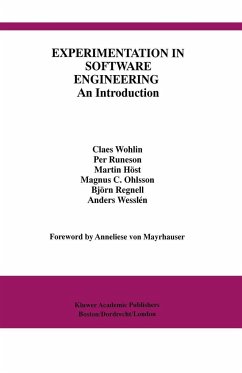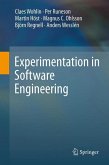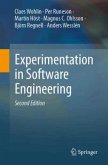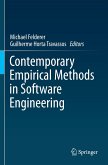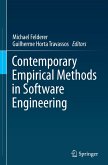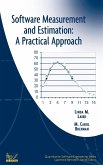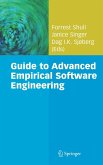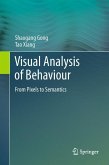The purpose of Experimentation in Software Engineering: An Introduction is to introduce students, teachers, researchers, and practitioners to experimentation and experimental evaluation with a focus on software engineering. The objective is, in particular, to provide guidelines for performing experiments evaluating methods, techniques and tools in software engineering. The introduction is provided through a process perspective. The focus is on the steps that we go through to perform experiments and quasi-experiments. The process also includes other types of empirical studies.
The motivation for the book emerged from the need for support we experienced when turning our software engineering research more experimental. Several books are available which either treat the subject in very general terms or focus on some specific part of experimentation; most focus on the statistical methods in experimentation. These are important, but there were few books elaborating on experimentation from a process perspective, none addressing experimentation in software engineering in particular.
The scope of Experimentation in Software Engineering: An Introduction is primarily experiments in software engineering as a means for evaluating methods, techniques and tools. The book provides some information regarding empirical studies in general, including both case studies and surveys. The intention is to provide a brief understanding of these strategies and in particular to relate them to experimentation.
Experimentation in Software Engineering: An Introduction is suitable for use as a textbook or a secondary text for graduate courses, and for researchers and practitioners interested in an empirical approach to software engineering.
The motivation for the book emerged from the need for support we experienced when turning our software engineering research more experimental. Several books are available which either treat the subject in very general terms or focus on some specific part of experimentation; most focus on the statistical methods in experimentation. These are important, but there were few books elaborating on experimentation from a process perspective, none addressing experimentation in software engineering in particular.
The scope of Experimentation in Software Engineering: An Introduction is primarily experiments in software engineering as a means for evaluating methods, techniques and tools. The book provides some information regarding empirical studies in general, including both case studies and surveys. The intention is to provide a brief understanding of these strategies and in particular to relate them to experimentation.
Experimentation in Software Engineering: An Introduction is suitable for use as a textbook or a secondary text for graduate courses, and for researchers and practitioners interested in an empirical approach to software engineering.
From the reviews: "The revised edition includes new chapters and examples, which further cements its place as the premier book on the topics of designing, constructing, executing, and assessing experiments in software engineering. (...) The revisions will make this book even more valuable. (...) It ought to be required reading for all PhD students; every academic's bookcase should have a copy." (Michael Oudshoorn, Computing Reviews, October, 2012) "This book is a landmark in allowing us to train both the researcher and practitioner in software engineering experimentation." (Victor R. Basili, University of Maryland, MD, USA) "The additions and modifications in this revised version very nicely reflect the maturation of the field of empirical software engineering." (Anneliese A. Andrews, University of Denver , CO, USA) "The volume, a revised edition of a work by the same name ... published in 2000, presents a very useful review of methods in software engineering research. It is structured as a textbook, making it useful for an introductory graduate-level course or a fourth-year course at the undergraduate level. Practitioners and experts will also benefit from this book, as they can use it as a starting point for more in-depth approaches. ... Summing Up: Highly recommended. Upper-division undergraduates through professionals/practitioners." (L. Benedicenti, Choice, Vol. 50 (9), May, 2013)
`This is a well written and concise book, which provides the reader with the essentials necessary to design, conduct and analyse a software engineering experiment. Its value lies in that it is specifically written for the software engineering field, and has surveyed the major contributions by a number of leading researchers in this area. A `how to' book is always welcome, both as a useful starting point to the inexperienced and as a helpful reference and reminder of best practice to others.'
Software Testing Verification and Reliability, 11 (2001)
Software Testing Verification and Reliability, 11 (2001)

